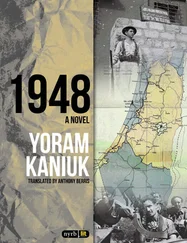A Jew in a white suit, and only when he got close did she see how dirty its cuffs were, approached and called the two sailors. From the distance, Rebecca had seen him wiping the sweat from his forehead after he took off the straw hat, and his watery eyes trying to hint something to her. When he started playing with coins he took out of his coat pocket and bouncing them one by one, she caught the lust the coins evoked in the eyes of the sailors and so she could calm down.
The Jew with her concluded the negotiations and approached her. Once again he took off his hat and said: Don't worry, madam, a room is waiting for you, if it can be called that, in a hotel, and tomorrow, the funeral will be held. And Rebecca said: I'm not worried, sir. I'll stay a while and then I'll go to America. The Jew wiped his sweat again, took out a chain of amber beads, played with them a little, and muttered: I don't care where you go, madam, or when. Jews come and Jews go. For me it's the same money. Permission for your husband's coffin is just as expensive as the return ticket you're going to buy from me. He didn't wait for her answer. Then he laughed. His laugh lacked symmetry and so it sounded thoroughly superfluous to her.
Joseph's hands rested like cotton on her body and were wiped out with the passing of his laugh. Now when she felt his sweat, she felt a certain closeness to him, maybe because he wasn't part of the wild vista of Nehemiah's longings either. If you need something, he said, don't hesitate to call me. Mr. Aviyosef Abravanel, everybody knows me! Scion of the house of David. When a kingdom is restored to Israel, after these ragamuffins, my son won't have to stand here and greet ships in corners bearing impending disaster, and his eyes flashed now, his pain changed into bliss. He didn't notice her contemplation or the change in her treatment of him, he was looking at Jews lying near the enclosures, waiting to board the ship depressed and despairing of the land, looking at the Pioneers who just came and who looked too excited and hungry for love of the Land that has no love to give, and he said: They don't know the laws of the exhilarating corruption of these Turks… their savagery, you've got to know how to make that baksheesh look delicate and cunning. When my son is king of Israel, guards will stand here in scarlet and silver, with flashing swords in their hands and the birds will sing verses from the Song of Solomon in Hebrew. The Turk with the truncheon now approached Mr. Aviyosef Abravanel. Mr. Abravanel put the string of amber beads in his pocket, lowered his face a bit, stooped over, and yet-and she saw that clearly-precisely measured his rigidity and the power of his money against the truncheon in the hands of the authorities. The Turk's look was both covetous and wicked. Mr. Abravanel's stoop was measured and the obsequiousness was precise. She didn't imagine how much she would enjoy that, she also felt stabbings in her belly, the pain passed and of all the names that rose in her mind, the last of them was Ebenezer. But Ebenezer was the only name Nehemiah intended for his son. She felt no love for the fetus in her womb. The stabbing belonged to Rachel's belly. The son who was to fill water jars for beautiful women of Bethlehem and to plow the land of his forefathers was only a proper and undesirable pause for her, for the disgrace she had brought on herself with her love for Joseph Rayna and her marriage to Nehemiah, two things, and she knew that well, that shouldn't have happened. Many years later, when she'd sit at the screened window with the flyswatter in her hand, looking joylessly at the almond groves she had cultivated, at her good citrus groves and vineyards, and Ahbed, the grandson or great-grandson of Ahbed, would put the big old fan in front of her and try to turn it on even though the generator was broken, she'd think of Boaz who was both her grandson and her son and would say to herself: How come Boaz, Nehemiah's grandson, would be the spit and image of Joseph Rayna? And the dark plot in her blood would then be poured into the tune that never let go of her, the tune of her secret unknown even to herself.
Moshe Isaac was born in Bukovina. In Poland he married Sarah, daughter of Rabbi Where-the-Wind-Goes-Down. After he moved to Galicia and begat five sons, his last son Jacob was born, and then he died and didn't move the rod even in the wind. Jacob who moved mountains with his eyes that went blind from thirst for salvation begat Joachim the Dane, who went to seek the traces of the Dane who saw the Sambatyon River circumventing the realms of Sabbath, found a wife in Russia, and became enslaved to her compassion for him. His son Sambatyon the Dane begat Nehazia the Dane, who was also called the Genius of Tarnopol, who returned his forefathers to the soil and annulled the observation of the sky not through books. Nehazia married his cousin Miriam, daughter of Elijah, and begat Avrum the tavern owner who taught children, and hid creatures who saw sights they shouldn't have seen and showed them the straight path. From many torments, he died while walking and was buried in a small cemetery where a two-headed cow was later seen. Avrum begat Moshe Isaac who learned a little math, wrote three books, and in his dreams would see a city named Berlin and knew the names of its streets by heart even though he had never been there. He married a wise and modest woman named Leah. Leah raised two daughters who died of typhus and a young son named Nehemiah. Moshe Isaac died young and had time to hear his son Nehemiah learn Talmud. Nehemiah left the faith, taught and studied the Torah of the Land of Israel, married Rebecca the daughter of the great-granddaughter of Secret Charity, husband and father of Rebecca Secret Charity. Nehemiah begat… The ship emitted a long siren and then a short one. The birds circled above the church that looked like cardboard from here. The light was blinding. Ebenezer stabbed the womb of his mother who was looking at the sands of the Land and didn't come to it.
Tape / -
Rebecca followed Mr. Abravanel's Arabs, who led the coffin on the back of a donkey. Behind her, the sea ended and now she was walking in dark moldy alleys. Niches that may have been shops swarmed with dusky human beings with burning eyes, beyond there the honking of a train was heard whose locomotive tried in vain to bestow an importance on the city but the palm trees had beautiful shapes and thin trunks. Rebecca calculated precisely the delusion in which she followed her man's coffin, and if there was any beauty in the shabby outposts of the ancient east that hysterical women sometimes used to exaggerate and glorify, she knew how to protest that misleading vision with smiling rage. The tears that would later flow from her eyes for eight years in a row were already waiting for her through her eyelashes. The new and ugly hotel was teeming with noisy Jews. Outside vegetables and flowers were sold and the smell of charred meat stood in the air. The fragrance of lemons and the sea only intensified the smell of charred meat revolving on spits as if human beings were being roasted. The coffin was put in her room. After the door closed behind them and the Jew in the white suit arranged everything and even hinted to the Turk who had followed them all the way to wait for him, only then did she calm down. When she decided not to weep yet, her eyelids almost swelled with tears. She went to the coffin and looked outside. She saw houses closing in on her from all sides. She looked here and there, lowered the filthy shade, opened the top of the coffin and Nehemiah got up, stretched, and hugged his wife. He said he would never again lie ten days in a coffin, even if he had to die for it. His face beamed with joy that didn't fade because of what he could see through the window or from the cracks of the coffin. When they looked outside through the transparent and filthy shade, Rebecca and Nehemiah saw two completely different landscapes.
Читать дальше












